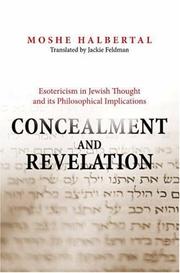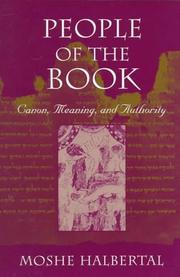| Listing 1 - 10 of 29 | << page >> |
Sort by
|

ISBN: 9780691125718 0691125716 9786612159183 1282159186 1400827965 9781400827961 9781282159181 Year: 2007 Publisher: Princeton, N.J. Princeton University Press
Abstract | Keywords | Export | Availability | Bookmark
 Loading...
Loading...Choose an application
- Reference Manager
- EndNote
- RefWorks (Direct export to RefWorks)
During the twelfth and thirteenth centuries, great new trends of Jewish thought emerged whose widely varied representatives--Kabbalists, philosophers, and astrologers--each claimed that their particular understanding revealed the actual secret of the Torah. They presented their own readings in a coded fashion that has come to be regarded by many as the very essence of esotericism. Concealment and Revelation takes us on a fascinating journey to the depths of the esoteric imagination. Carefully tracing the rise of esotericism and its function in medieval Jewish thought, Moshe Halbertal's richly detailed historical and cultural analysis gradually builds conceptual-philosophical force to culminate in a masterful phenomenological taxonomy of esotericism and its paradoxes. Among the questions addressed: What are the internal justifications that esoteric traditions provide for their own existence, especially in the Jewish world, in which the spread of knowledge was of great importance? How do esoteric teachings coexist with the revealed tradition, and what is the relationship between the various esoteric teachings that compete with that revealed tradition? Halbertal concludes that, through the medium of the concealed, Jewish thinkers integrated into the heart of the Jewish tradition diverse cultural influences such as Aristotelianism, Neoplatonism, and Hermeticisims. And the creation of an added concealed layer, unregulated and open-ended, became the source of the most daring and radical interpretations of the tradition.
Esoteric sciences --- Jewish religion --- Mysticism --- Cabala --- Judaism --- History. --- History --- Judaism. --- Mysticism - Judaism --- Cabala - History. --- Judaism - History - Medieval and early modern period, 425-1789

ISBN: 9780674038141 0674038142 9780674661110 0674661117 9780674661127 0674661117 0674661125 0674661125 9780674661127 Year: 1997 Publisher: Cambridge (Mass.): Harvard university press
Abstract | Keywords | Export | Availability | Bookmark
 Loading...
Loading...Choose an application
- Reference Manager
- EndNote
- RefWorks (Direct export to RefWorks)
People of the Book offers an introduction to Jewish hermeneutics, and conveys the importance of the tradition to both general and academic readers.
221.011 --- Oud Testament: canon --- Bible. --- Antico Testamento --- Hebrew Bible --- Hebrew Scriptures --- Kitve-ḳodesh --- Miḳra --- Old Testament --- Palaia Diathēkē --- Pentateuch, Prophets, and Hagiographa --- Sean-Tiomna --- Stary Testament --- Tanakh --- Tawrāt --- Torah, Neviʼim, Ketuvim --- Torah, Neviʼim u-Khetuvim --- Velho Testamento --- Canon. --- Criticism, interpretation, etc., Jewish. --- 221.011 Oud Testament: canon --- Theology. --- Christian theology --- Theology --- Theology, Christian --- Christianity --- Religion --- Bible. Old Testament --- Criticism, interpretation, etc. [Jewish ] --- Canon
Book
ISBN: 9780691152851 Year: 2012 Publisher: Princeton Princeton university press
Abstract | Keywords | Export | Availability | Bookmark
 Loading...
Loading...Choose an application
- Reference Manager
- EndNote
- RefWorks (Direct export to RefWorks)
Sacrifice --- Self-sacrifice --- Altruism --- Burnt offering --- Worship --- Philosophical anthropology
Book
ISBN: 1283457024 9786613457028 1400842352 9781400842353 0691152853 9781283457026 9780691152851 Year: 2012 Publisher: Princeton : Princeton University Press,
Abstract | Keywords | Export | Availability | Bookmark
 Loading...
Loading...Choose an application
- Reference Manager
- EndNote
- RefWorks (Direct export to RefWorks)
The idea and practice of sacrifice play a profound role in religion, ethics, and politics. In this brief book, philosopher Moshe Halbertal explores the meaning and implications of sacrifice, developing a theory of sacrifice as an offering and examining the relationship between sacrifice, ritual, violence, and love. On Sacrifice also looks at the place of self-sacrifice within ethical life and at the complex role of sacrifice as both a noble and destructive political ideal. In the religious domain, Halbertal argues, sacrifice is an offering, a gift given in the context of a hierarchical relationship. As such it is vulnerable to rejection, a trauma at the root of both ritual and violence. An offering is also an ambiguous gesture torn between a genuine expression of gratitude and love and an instrument of exchange, a tension that haunts the practice of sacrifice. In the moral and political domains, sacrifice is tied to the idea of self-transcendence, in which an individual sacrifices his or her self-interest for the sake of higher values and commitments. While self-sacrifice has great potential moral value, it can also be used to justify the most brutal acts. Halbertal attempts to unravel the relationship between self-sacrifice and violence, arguing that misguided self-sacrifice is far more problematic than exaggerated self-love. In his exploration of the positive and negative dimensions of self-sacrifice, Halbertal also addresses the role of past sacrifice in obligating future generations and in creating a bond for political associations, and considers the function of the modern state as a sacrificial community.
Self-sacrifice. --- Sacrifice. --- Altruism --- Sacrifice --- Burnt offering --- Worship --- Christianity. --- God. --- Jewish life. --- Judaism. --- Paul Kahn. --- Western religious life. --- agent-relative actions. --- attentiveness. --- categorical imperative. --- charity. --- civilians. --- competition. --- cooperation. --- dependency. --- ethical life. --- ethics. --- evolutionary biology. --- exchange. --- general will. --- golden rule. --- heroic sacrifices. --- humans. --- individuals. --- instrumental relationship. --- laws of war. --- love. --- loyalty. --- martyr. --- modern state. --- moral sphere. --- original position. --- other. --- past sacrifice. --- political bond. --- political life. --- political order. --- political violence. --- politics. --- prayer. --- psychoanalysis. --- religion. --- religious life. --- reliigous communities. --- retroactive desecration. --- ritual. --- sacrifice. --- sacrificial community. --- sacrificial system. --- sacrificing for. --- self-interest. --- self-sacrifice. --- self-transcendence. --- self. --- social contract. --- soldiers. --- sovereign. --- state. --- suffering. --- temple worship. --- utilitarianism. --- violence. --- war.
Book
ISBN: 1951498755 1951498763 1951498771 Year: 2020 Publisher: The Society of Biblical Literature
Abstract | Keywords | Export | Availability | Bookmark
 Loading...
Loading...Choose an application
- Reference Manager
- EndNote
- RefWorks (Direct export to RefWorks)
Book
ISBN: 9781400848478 Year: 2013 Publisher: Princeton, NJ
Abstract | Keywords | Export | Availability | Bookmark
 Loading...
Loading...Choose an application
- Reference Manager
- EndNote
- RefWorks (Direct export to RefWorks)
Article
Abstract | Keywords | Export | Availability | Bookmark
 Loading...
Loading...Choose an application
- Reference Manager
- EndNote
- RefWorks (Direct export to RefWorks)
Digital
ISBN: 9780674038141 Year: 2022 Publisher: Cambridge, Mass. Harvard University Press
Abstract | Keywords | Export | Availability | Bookmark
 Loading...
Loading...Choose an application
- Reference Manager
- EndNote
- RefWorks (Direct export to RefWorks)

ISBN: 9781400827961 9780691125718 Year: 2009 Publisher: Princeton, N.J. Princeton University Press
Abstract | Keywords | Export | Availability | Bookmark
 Loading...
Loading...Choose an application
- Reference Manager
- EndNote
- RefWorks (Direct export to RefWorks)
Digital
ISBN: 9781400842353 9780691152851 Year: 2012 Publisher: Princeton, N.J. Princeton University Press
Abstract | Keywords | Export | Availability | Bookmark
 Loading...
Loading...Choose an application
- Reference Manager
- EndNote
- RefWorks (Direct export to RefWorks)
| Listing 1 - 10 of 29 | << page >> |
Sort by
|

 Search
Search Feedback
Feedback About UniCat
About UniCat  Help
Help News
News